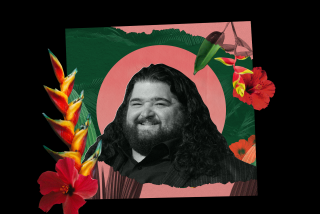It’s an invasion of the serial thrillers
- Share via
“THE NINE,” a new fall drama on ABC, is “Lost” without the plane crash and the island but with the same “Rashomon”-like revisiting of a cataclysmic event.
In this case, it’s a 52-hour hostage ordeal at a downtown bank that forges a bond among nine people. There is also, this fall, a season-long kidnapping ordeal (NBC’s “Kidnapping”), not to be confused with the disappearance of a senator’s wife (Fox’s “Vanished,” which is possibly a kidnapping).
If I may be so bold, “The Nine” seems the most promising of the new fall neo-nonlinear-thrillers-with-multiple-points-of-view-that-also-revolv e-around-relationships-and-come-with-a-cryptic-and/or-pithy-show-titl e.
That’s “serialized drama” for short, the next new thing in TV, the genre of the moment -- the word “serialized” meant to convey a series whose layered plot contrivances and multirelational characters -- “24” and “Lost” are the two most popular examples -- require a deeper, and thus more loyal, commitment from the viewer.
To use a different metaphor, you can’t hop on and off these shows; there’s only one train to resolution, and it’s an express. As a genre name, the “serialized drama” lacks a certain correlation to established lexicon, at least going by the general definition of “serial” as “a literary or dramatic work published or produced in installments.”
By that definition, nearly all of TV (forgetting for a moment the phrase “literary or dramatic work”) is serialized, from “American Idol” to “The Price Is Right.” Nobody called “The West Wing” or “NYPD Blue” serialized dramas, even though it helped to know, respectively, that President Josiah Bartlet had been diagnosed with multiple sclerosis or that Andy Sipowicz was an alcoholic. True, those shows also regenerated themselves each week, tossing up fresh crises and resolving them within the hour -- the traditional, more amnesiac role of a TV drama.
As TV-industry speak, “serialized drama” -- like dramedy, flawed character and Ryan Seacrest -- has taken on a momentum of its own. It means your show is a puzzle piece, an enigma wrapped around a riddle; in short, it’s a long story, and nobody has time to get you caught up.
Which is really the juicy implication of “serialized drama,” as network executives and the media throw it out: As much as it’s about sucking viewers in, it’s equally about making those who fail to watch feel left out.
HBO, largely via “The Sopranos,” has been excellent at engendering abandonment issues, both among subscribers waiting for returning series and nonsubscribers completely out of the loop. So now the broadcast networks, which operate in the paradox of a more constrained but higher-volume business, are trying to induce a similar, vague panic.
It makes sense, this shift in the broadcast network business toward inclusion-exclusion, for it reflects the explosion of entertainment options available to people nowadays, amid an increasing sense that broadcast television, to thrive as in days of old, has to engender a deeper intimacy with its distracted viewership.
Maybe that’s why I experienced so many of the pilots, at first blush, as features -- glossy, big-bang events that look extremely good. There’s a lot at the buffet, and it’s probably a shame; all this narrative drive -- less so, character complexity -- suddenly visiting the small screen.
Though the vogue in serials last season was sci-fi, this year’s crop seems more to ape psychological thrillers of recent vintage, like “Memento” or “The Usual Suspects.”
You might be willing to follow the kidnapping of a socialite couple’s son (NBC’s “Kidnapped”) for a season, but will you have the capacity also to become embroiled in the season-long disappearance of the senator’s vanished wife on Fox’s “Vanished”)? Will either of them make it long enough to get to the episode with the ransom note?
In this context, the “serialized drama” is really a fancied-up phrase for whodunit or what-is-it, or how-can-we-stop it, which is hardly surprising in the age of the war on terror. None of the new dramas are serialized stories about, say, love and marriage, such as Ingmar Bergman’s classic “Scenes From a Marriage,” which started as a six-episode series on Swedish TV, complete with Bergman himself providing voice-overs catching viewers up on the story (Hint: It didn’t involve a hatch, a plot to assassinate the president, or a prison break).
“In general, a TV miniseries, broadcast over several nights, has the tendency to intersect with and form a more quotidian relationship to viewers’ lives,” the essayist and novelist Phillip Lopate wrote in an essay comparing the series to the edited-down film version. “Its characters become members of the family, and their resilience over time, regardless of the incessant crises thrown them by the script, induces a more good-humored, forgiving atmosphere.”
Time is not a luxury for the networks; even miniseries have fallen by the wayside, largely because they’re expensive and might tank in the ratings on Night 1 and have little resale value.
But no one yanks a mini once it’s on. Serialized dramas are different -- the network promises you essentially an extended miniseries, a season-long mystery hurtling toward a stunning conclusion, only to provide none when the show is canceled for poor ratings.
At least one of the new shows, for instance, NBC’s “Friday Night Lights,” based on the nonfiction book and film of the same name, will evidently follow a high school football team through an entire season (where it goes from there, or even if it gets there, is another issue).
That bait-and-switch was a hot topic at this week’s Television Critics Assn. tour in Pasadena, where during news conferences network executives were repeatedly asked whether they risked alienating viewers long-term by aborting shows (and thus intricate story lines) in midstream.
“I don’t think audiences make a decision to commit to a show, one way or the other, based on it being serialized or not,” said Nina Tassler, president of CBS Entertainment, whose network has two new series that fall under that rubrick, “Jericho” (Kansas town confronts mushroom cloud) and “Smith” (crack band of high-stakes thieves pulls off robberies).
The reporters guffawed, harrumphed, pressed her further. What about the poor fans of canceled serials, such as last year’s Fox show “Reunion”? Or CBS’ own “Threshold”? Or ABC’s “Invasion”? They never got an answer to the riddle.
By Tuesday, when it was ABC’s turn, some producers were distancing themselves from the tag.
“I wouldn’t call this a serial, if by serial you mean you have to watch it every week to know what’s going on,” Stuart Zicherman, executive producer of ABC’s “Six Degrees,” said of his show, which comes from producers of “Lost” (!). The summary tag of “Six Degrees” goes: “Six very different New Yorkers go about their lives without realizing the impact they’re having on one another.”
Sounds an awful lot like what TV means by serialized.
And yet, some of the panic is unwarranted. A newcomer could probably tune in to the third season of “Lost” and not be that far behind. They crashed, they survived, they found a hatch.
If you miss the pilot of “The Nine,” will you be able to tune in Week 2? Of course. And then again, of course not. “The Nine” is about a 52-hour hostage-taking at a bank, although you don’t experience the actual event in the pilot so much as the fateful beforehand and the rippling aftermath. From nine points of view. Going back and forth and back again in time.
Brownfield is a Times TV critic. Send comments to calendar.letters@latimes .com.
More to Read
The complete guide to home viewing
Get Screen Gab for everything about the TV shows and streaming movies everyone’s talking about.
You may occasionally receive promotional content from the Los Angeles Times.






